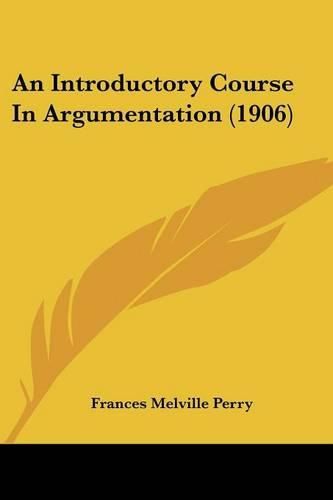Readings Newsletter
Become a Readings Member to make your shopping experience even easier.
Sign in or sign up for free!
You’re not far away from qualifying for FREE standard shipping within Australia
You’ve qualified for FREE standard shipping within Australia
The cart is loading…






Purchase of this book includes free trial access to www.million-books.com where you can read more than a million books for free. This is an OCR edition with typos. Excerpt from book: DECIDING ON THE PROPOSITION Having selected a question both interesting and familiar, we must next reach a conclusion regarding this question that can be stated in a proposition which shall form the basis for argument. It is possible to make others believe that a conclusion is true which you believe to be false. Lawyers doubtless often do this; a student in a debate course necessarily sometimes takes what seems to him the weaker side of the question. It is good discipline for a student to be obliged to see so clearly the strong points in the side of the case that does not enlist his sympathy that he is able successfully to advocate it. But in general argumentation it is not necessary, and for some reasons it seems unwise, to attempt to prove what one does not believe to be true. In the first place, faith in your case makes your work lighter. If you are sure you are in the right, it seems worth while to exert yourself to make others see as you see, and you are willing to encounter difficulties to prove your point. If you have no convictions either way, or if you see the weakness of your own case, it is hard to work with ardor. Rufus Choate said:
I care not how hard the case is. It may bristle with difficulties. If I feel that I am on the right side, that case I win. It was so distasteful to Abraham Lincoln to make the worse appear the better reason that he made it a rule to advocate only the side that he believed to be right. The moral force he consequently threw into his argument made
Honest Abe
an opponent that few could match. In the second place, argument for argument’s sake leads to the habit of specious reasoning, of caring more to make an appearance of right, than to make right appear. If argument teaches us merely to confound our opponents with conc…
$9.00 standard shipping within Australia
FREE standard shipping within Australia for orders over $100.00
Express & International shipping calculated at checkout
Purchase of this book includes free trial access to www.million-books.com where you can read more than a million books for free. This is an OCR edition with typos. Excerpt from book: DECIDING ON THE PROPOSITION Having selected a question both interesting and familiar, we must next reach a conclusion regarding this question that can be stated in a proposition which shall form the basis for argument. It is possible to make others believe that a conclusion is true which you believe to be false. Lawyers doubtless often do this; a student in a debate course necessarily sometimes takes what seems to him the weaker side of the question. It is good discipline for a student to be obliged to see so clearly the strong points in the side of the case that does not enlist his sympathy that he is able successfully to advocate it. But in general argumentation it is not necessary, and for some reasons it seems unwise, to attempt to prove what one does not believe to be true. In the first place, faith in your case makes your work lighter. If you are sure you are in the right, it seems worth while to exert yourself to make others see as you see, and you are willing to encounter difficulties to prove your point. If you have no convictions either way, or if you see the weakness of your own case, it is hard to work with ardor. Rufus Choate said:
I care not how hard the case is. It may bristle with difficulties. If I feel that I am on the right side, that case I win. It was so distasteful to Abraham Lincoln to make the worse appear the better reason that he made it a rule to advocate only the side that he believed to be right. The moral force he consequently threw into his argument made
Honest Abe
an opponent that few could match. In the second place, argument for argument’s sake leads to the habit of specious reasoning, of caring more to make an appearance of right, than to make right appear. If argument teaches us merely to confound our opponents with conc…